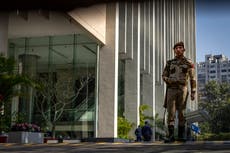India expands investigation into BBC as more charges brought and workers questioned
Action comes months after country’s tax authorities conducted ‘surveys’ at BBC offices


Authorities in India have brought a new case against the BBC for alleged violations of foreign exchange rules, months after multiple tac raids on the broadcaster’s offices in New Delhi and Mumbai.
The actions come after the BBC aired a documentary about the 2002 Gujarat religious riots, with new evidence suggesting Narendra Modi was “directly responsible” for the circumstances leading up to violence in which over 1,000 people – many of them Muslims – were killed. Mr Modi, a Hindu nationalist, was subsequently elected prime minister of India.
Officials from the Enforcement Directorate (ED), a branch of the finance ministry tasked with investigating serious financial crimes, told Press Trust of India that an investigation had been opened under the country’s law related to foreign funding.
Authorities called for documents and recorded the statements of executives in keeping with the provisions of the Foreign Exchange Management Act (FEMA), ED sources told The Indian Express. They said the probe is looking into purported violations by the BBC related to foreign direct investment (FDI) – a category of cross-border investment.
“Today, they have called another employee of BBC along with some documents and questioning is still going on,” an official was quoted as telling the newspaper.
The Independent has reached out to the BBC and the finance ministry for comment.
The action comes months after India’s income tax authorities conducted three-day-long raids at the BBC offices in February.
The raids, dubbed “surveys” by government authorities, were a part of a probe into “deliberate non-compliance with transfer pricing rules” and the BBC’s “vast diversion of profits”.
The “surveys” were also over the “manipulation of prices for unauthorised benefits, including tax advantages”, per officials.
The BBC series featured a previously unpublished UK government assessment that prime minister Narendra Modi was “directly responsible” for the circumstances leading up to violence in which over 1,000 people – many of them Muslims – were killed.
Last year, India’s Supreme Court cleared Mr Modi of wrongdoing over the riots, with earlier investigations citing insufficient evidence to prosecute him over allegations that he ordered police to step aside and let the riots play out.
Clips of the BBC series were briefly available on YouTube and were widely shared on Twitter.
The Indian government, however, blocked the documentary series by issuing orders to both YouTube and Twitter to block content related to it using emergency powers under the country’s information and technology laws.
The series was also criticised by the Indian government as a “propaganda piece” that reflects a “continued colonial mindset”.
The BBC defended its production and said it adheres to the highest editorial standards.
Last month, the Twitter account of BBC News’s Punjabi language service was blocked in India amid the ongoing nationwide manhunt for a controversial preacher and separatist leader.
The account was, however, later reactivated.
In March, British foreign minister James Cleverly had raised the issue of tax raids on the BBC’s offices in India during a meeting with his Indian counterpart in Delhi.
A plea in the Supreme Court by 14 of India’s opposition parties was dismissed earlier this month. It had accused Mr Modi’s government of misusing federal probe agencies like the ED to go after leaders critical of the current dispensation.
The plea had alleged there to be a “drastic and exponential increase” in the number of cases registered by the ED and the Central Bureau of Investigation – the country’s primary investigative agency – against opposition leaders ever since Mr Modi came to power in 2014.
Join our commenting forum
Join thought-provoking conversations, follow other Independent readers and see their replies
Comments


Bookmark popover
Removed from bookmarks